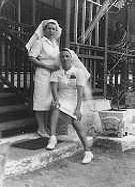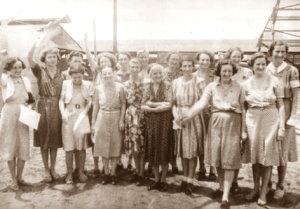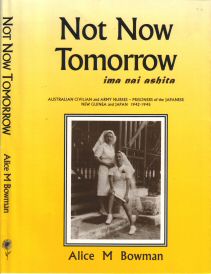
The Author
Brisbane 1951
Alice M Bowman
1912 - 2000
Alice M Bowman preferred, always, to be known as Bowie. She was born on the 3rd July 1912 in Longreach, Queensland, an only daughter with two younger brothers. Bowie's father, William James, died suddenly in 1919 of the Influenza epidemic which caused over 10,000 deaths in Australia and devastated populations around the world. He was a son of the pioneering Bowman family of the Queensland Outback. Towards the end of the 19th century, all but one of the twelve Bowman brothers set out from South Australia towards Queensland where the favourable conditions of land settlement, offered by the Government of the day, attracted many pastorlists prepared to brave the desolate interior. Bowie's father was running the JC Hotel at Canterbury at the time of his death. In 1922, Bowie's widowed mother married Alexander (Alec) Palmer Shand; in the 1940s, with three additional children, the family moved to Brushgrove in Northern New South Wales.
Bowie grew up in the harsh environment of Queensland's Channel Country; she and her brothers were tutored by a "remittance man" from England. Her mother encouraged her to train for secretarial duties and after completing this course Bowie chose to pursue a career in nursing, gaining her General Nursing certificate with training at Maryborough Hospital and her Midwifery certificate at Cairns Base Hospital. In early 1939 she gained a position through External Affairs Canberra at the Australian Government Administration hospital in Rabaul.
The ordeal of the war over, Bowie returned from imprisonment in Japan and settled in Brisbane, where she married Gordon Déglon in 1951. Gordon Déglon was an AIF veteran of the Second World War, having seen service in the Middle East and New Guinea. Bowie and Gordon made their home in South Africa, which was Gordon's birthplace and where he died in 1977. Bowie remained in South Africa where she continued nursing until her very senior years. She loved her garden and her companionable dogs and was supported in widowhood by many good friends; her sincere personality and effervescent nature endeared her to all. With declining health in later years and far from home Bowie was lovingly cared for by the staff at Hillcrest Hospital, near her home on the outskirts of Durban and where she had worked for many years caring for her own patients. Bowie died peacefully in January 2000 with her dear friend Monica by her side.

Rabaul 1939
Bowie's manuscript was written over a number of years from her diary (stealthily kept whilst held captive) and from the diary of her lifelong friend, Joyce McGahan. Bowie and Joyce (pictured on the cover of Not Now Tomorrow) supported each other throughout their years in captivity and during the ensuing recuperating years. There was no structure in place for support and welfare of civilian nurses on their return, particularly the Government nurses, although, through the Union Jack Club in Queensland and Brisbane's leading newspsper, the Brisbane Courier Mail, a substantial sum of money was raised and distributed amongst the returning Queensland prisoner-of-war nurses (army and civilian) from Singapore and Rabaul. Bowie used her share wisely and opened a child-care, day nursery in the Valley, Brisbane. It was here that she met her husband, Gordon Déglon, who was at that time proprietor of The Valley Advertiser newspaper.
Origin of the Title
The title of Bowie's book Not Now Tomorrow stems from a special segment towards the end of the nurses' imprisonment. Interaction with the prominent Japanese Obasan in the village of Totsuka, south of Yokohama, was a period crucial to their survival. Starvation was already taking its toll and bartering for food with the Obasan was a constant occupation. The food was not always forthcoming, as promised, and the Obasan would persistently reiterate "ima nai ashita". A Japanese phrase book provided the interpretation: not now tomorrow! The Obasan did not realise that tomorrow was of special significance to the nurses — tomorrow when the Japanese would be defeated. Unwittingly, she was fuelling an even more powerful determination of their faith in this word. Bowie wrote this segment of the Rabaul Nurses story for a South African radio program in Durban which was read in the 1980s.
The following lines, about the Obasan's broken promises, were written by Mrs. Bignell and are quoted from The Battle of the Sachies, one of her many poems written whilst she was a prisoner in Japan and featured in Yield Not to the Wind, her life story written by her daughter, Margaret Clarence, as mentioned in The Nurses page of this website. The sachie or sweet potato was not a common vegetable in Australia in those days, however, the civilian nurses of New Guinea were familiar with it as the humble kaukau, although it was never a favoured food. In Japan, hunger found sachies irresistible and the nurses could never get enough of them!
Just how these sachies could be bought.
We tried her with sens, with soap and with money,
We tried her with soft words and smiles sweet as honey,
We tried her with bribes, with sewing and knitting,
We petted her kids whom we'd rather be kicking,
But "Not now, tomorrow," was all she would say,
And we'd mutter, "You old bitch - there'll soon come a day."
All prisoners-of-war placed faith in the hope of tomorrow when the world would be free. On a tree in a cutting on the infamous Thai-Burma railway are the touching words: When you go home Tell them of us and say We gave our tomorrow For your today. In the seventeen months it took to complete this Herculean task, 100,000 Allied POWs never saw tomorrow; they perished as a result of starvation, disease and brutality at the hands of Japanese and Korean guards! Bowie's friend and POW colleague among the Administration nurses, Jean McLellan (LikLik) from Dalby, Queensland, lost her brother on the construction of this railway.
Advance Australia Fair
Although having lived for forty-one years in Natal, South Africa (with a short time spent in Malawi) Bowie remained a staunch, patriotic Australian. Her story is dedicated to her profession, her colleagues and her country, Australia.

